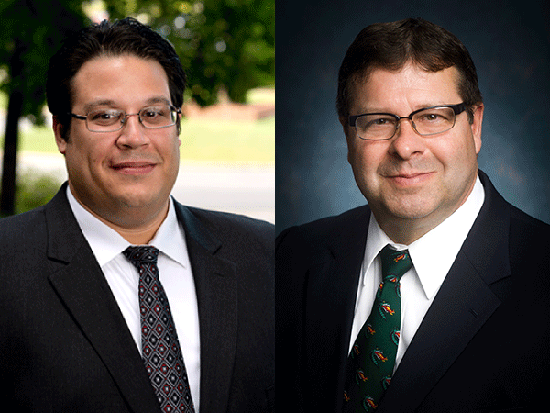Media contact: Adam Pope
 From left to right, Paul M. Di Gangi, Ph.D., and Jack L. Howard, Ph.D., Collat School of Business professors.More than 50 million workers in the United States are part of the gig economy, either to supplement their main income or as their full-time job. New research by University of Alabama at Birmingham Collat School of Business professors Paul M. Di Gangi, Ph.D., and Jack L. Howard, Ph.D., and colleagues explore how gig workers can use online communities to increase their earnings.
From left to right, Paul M. Di Gangi, Ph.D., and Jack L. Howard, Ph.D., Collat School of Business professors.More than 50 million workers in the United States are part of the gig economy, either to supplement their main income or as their full-time job. New research by University of Alabama at Birmingham Collat School of Business professors Paul M. Di Gangi, Ph.D., and Jack L. Howard, Ph.D., and colleagues explore how gig workers can use online communities to increase their earnings.
Their study, titled “The influence of political skill and community capabilities on microtask worker hourly wage: A mixed-methods study of Mechanical Turk,” was published in the Journal of the Association for Information Systems. The research shows that, while gig work offers financial opportunities, many workers often earn less than minimum wage. The key to improving their earnings lies in political skill, which helps workers make the most of online communities.
Di Gangi, who teaches courses on emerging technologies and cybersecurity, and Howard, who focuses on human resource management and compensation, studied Amazon Mechanical Turk (MTurk) workers. MTurk is a platform that connects freelancers with businesses needing virtual tasks done.
Over the years, Di Gangi and Howard have published multiple papers on the impact of MTurk thanks to support from the Dora and Sanjay Singh Endowed Fund for Information Systems Research. Their latest work, along with earlier articles in Internet Research (2022) and the International Journal of Information Management (2023), highlights the importance of social skills. They found that, while technical skills are important for productivity, social skills (like political skill and social capital) help workers gather information and gain emotional support. This enables them to recognize and seize gig work opportunities, improving their financial well-being.
Their collective research suggests that gig workers aiming for financial success should invest time in building connections with fellow gig workers. These relationships can help them learn about and evaluate potential gigs, ultimately boosting their earnings.
Di Gangi is a professor of information systems, senior editor at MIS Quarterly Executive, and associate editor at the European Journal of Information Systems and Information & Management. Howard is the former editor-in-chief of the Employee Rights and Responsibilities Journal and a professor of management and human resources. This is their fifth research publication together, focusing on workforce development in new economic markets.